

Study shows circadian disruption damages the gut and microbiome. Circadian disruption increases the risk of many health problems.
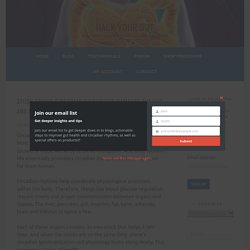
Most of the chronic health issues plaguing us today are either caused or made worse by circadian disruption. And since modern life essentially promotes circadian disruption, this is bad news for team human. Circadian rhythms help coordinate physiological processes within the body. Therefore, things like blood glucose regulation require timely and proper communication between organs and tissues. The importance of circadian rhythms in gut health. Well, in my last blog I said I was going to test the format for my upcoming circadian program and here it is.

In this powerpoint presentation video I cover why anyone looking to improve their gut health should take a look at syncing their circadian clocks. I’d like to know your thoughts on the layout, the length, the content, everything. Most importantly, I’d like to know if this is a viable medium for you to learn with. So, leave a comment below if you have anything to add and feel free to join the private facebook group here if you’re interested in learning about the circadian program and what it’s all about. Thank you and enjoy! EDIT: The program is now live and has grown to 9 hours of video.
My new Circadian Retraining Program helps you set your light exposure, feeding/fasting cycle, and physical activity so that you can take advantage of properly synced clocks. Like this: Like Loading... Disrupted Gut Clocks Linked with IBS, GERD, Obesity, and Other GI Concerns. Gut microbe movements regulate host circadian rhythms. Even gut microbes have a routine.
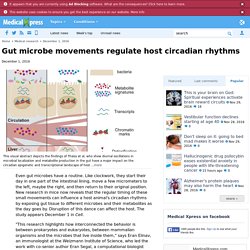
Gut Microbes and Their Circadian Rhythm: Melatonin May Play a Role. Research has shown that melatonin may be an important player in the health of gut microbes and their circadian rhythm.

The old adage tells us, “You are what you eat.” While this is not entirely true, our GI tracts are indeed an important part of our physical and emotional health. Not only does what we eat feed our cells, but it also feeds our microbiome, or the populations of microorganisms that live in our GI tracts. The Inner Life of Microbes Most of us don’t think a lot about the bacteria that live inside our digestive tract. Gut microbes are not passive inhabitants of our bodies.
Bacterial Circadian Clocks Set By Metabolism, Not Light. Most organisms on Earth, from bacteria to humans, possesses a circadian clock, a biological mechanism that synchronizes activities such as rest or growth to daily changes in a 24-hour day.
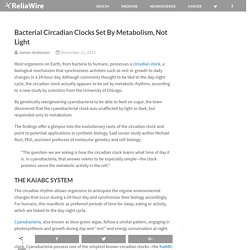
Although commonly thought to be tied to the day-night cycle, the circadian clock actually appears to be set by metabolic rhythms, according to a new study by scientists from the University of Chicago. By genetically reengineering cyanobacteria to be able to feed on sugar, the team discovered that the cyanobacterial clock was unaffected by light or dark, but responded only to metabolism.
Fasting, Circadian Rhythms…and the Potato Diet. Two studies published this week, both relate to the efficacy of The Potato Hack.
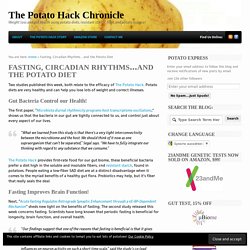
Potato diets are very healthy and can help you lose lots of weight and correct illnesses. Gut Bacteria Control our Health! “What we learned from this study is that there’s a very tight interconnectivity between the microbiome and the host. We should think of it now as one supraorganism that can’t be separated,” Segal says. “We have to fully integrate our thinking with regard to any substance that we consume.” Jet Lag Upsets Gut Microbes. How is the immune system linked to the circadian clock? Dr.
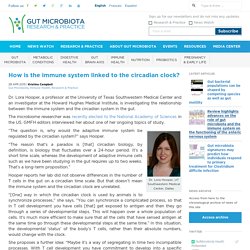
Lora Hooper, a professor at the University of Texas Southwestern Medical Center and an investigator at the Howard Hughes Medical Institute, is investigating the relationship between the immune system and the circadian system in the gut. The microbiome researcher was recently elected to the National Academy of Sciences in the US. GMFH editors interviewed her about one of her ongoing topics of study. Dr. Lora Hooper, UT Southwestern Medical Center, Dallas. The circadian influence on gut health and disease - Hack your gut. Synopsis Circadian rhythms play an important role in our biology by adjusting it in a way that takes advantage of patterns in food availability.

They exert a substantial influence over our physiology by controlling many aspects of our behavior including state of arousal, motivation, appetite, and digestion. Circadian disruption is associated with a number of GI disorders including inflammatory bowel disease, irritable bowel syndrome, small intestinal bacterial overgrowth, ulcers, and gut dysbiosis. This association may or may not be causal, but the evidence indicates that circadian disruption, at the very least, exacerbates symptoms of these conditions. In some cases, there is direct evidence that addressing factors that cause circadian misalignment can dramatically improve gut disorders. The evidence indicates that addressing circadian misalignment by scheduling exposure to factors that manipulate it is a valuable tool in the healing process for GI disorders.
Introduction Taken from: Ulcers. Is bile the key that turns on the gut clock? - Hack your gut. If you’ve found your way to this blog, chances are you’ve heard of the term “leaky gut”.

You’re also probably familiar with how chronic inflammation can wreak havoc on your health. In a previous blog I went over how the gut regulates how leaky and inflamed it is via the pregnane X receptor. If you haven’t read that blog, check it out here because it will be important to grasp that concept a little later. The timing of food consumption influences the human salivary microbiota.